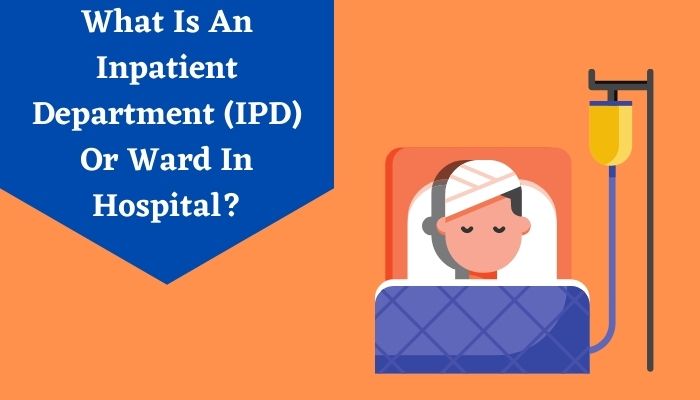What Is An Inpatient Department (IPD) Or Ward In Hospital?
With the pandemic situation all around, we have seen a tremendous uplift in the medical facilities provided by different hospitals and the healthcare industry. At times the health condition of a person degrades to such a level that he/she needs inpatient care. For this, the person is advised to get admitted to the hospital’s IPD. IPD full form is Inpatient Department.

If you know what is OPD then it is obvious for you to be curious to know what is IPD? Whether an IPD or OPD, it is wise for a person to get health insurance coverage to meet the expenses of both these hospital departments. Having a good health insurance plan does make sense to get health under check through the facilities of OPD and IPD.
Let’s dig deeper to understand what is IPD in hospitals and what is the difference between OPD and IPD?
What is IPD Full Form?
IPD full form in medical terms is Inpatient Department. Let’s first understand what is the inpatient meaning in this abbreviation. By “inpatient”, we mean a patient admitted to the hospital. The term “inpatient” is just the opposite of what “outpatient” means. Now, that you have understood what IPD stands for, it is time we acquaint you with what is IPD in a hospital?
What is IPD?
Like there are different types of wards in a hospital, there are different types of departments too. IPD is a department in a hospital that takes care of patients admitted in the hospital for at least a night. An Inpatient Ward or Department is fully equipped with medical equipment and beds. The patient admitted to an Inpatient Ward is taken care of by the nurses and doctors for appropriate treatment.
What are IPD Benefits?
Following are the list of IPD benefits that one may reap as an inpatient in a hospital:
- Constant care of doctors and nurses
- Proper diagnosis of your medical condition through lab tests
- Treatments related to cardiology, neurology, oncology, orthopedics, and general surgery
- After-care due to surgery, childbirth, or traumatic injury
- Pre-planned inpatient care for a knee transplant or bypass heart surgery
- Emergency healthcare for serious conditions like heart attack, accidental injuries
What are the Types of Inpatient Care offered in an IPD?
Following are some types of inpatient care offered in a hospital’s Inpatient Department:
- Severe burn injuries
- Serious illnesses like stroke, cardiac attack
- Traumatic head injuries
- Treatment for serious mental illness or disorder
- Treatment for chronic diseases like COPD and cancer
- Few cosmetic surgeries
What is the Cost of IPD?
OPD and IPD differ a lot in terms of cost. The cost of inpatient care or IPD is higher than OPD.
Some of the main factors that lead to a higher cost of an IPD are:
- Treatment Cost
- Administrative Fee
- Doctor Visiting Fee
- Lab Test Fee
- Medical Equipment Fee
- Pharmacy Cost
- Nurse, Radiologist, Specialist, Technician Fee
What is the Difference between OPD and IPD?
The basic difference between an OPD and IPD is in the level of care and treatment given to a patient. OPD stands for Outpatient Department, whereas, IPD full form is Inpatient department.
- Duration of Stay: The former does not require a patient to get admitted to a hospital for even a night. While a patient is required to stay in an IPD for at least 24 hours.
- Cost Factor: Secondly, there is a lot of difference in terms of cost of both OPD and IPD. OPD is cheaper than IPD because here the patient is not admitted to the hospital.
- Revisiting Parameter: Thirdly, a patient might need to revisit an OPD again and again for consultation, but this is not the case with an Inpatient Department.
- Type of Care: More dedicated care is provided to the patient in an IPD as compared to an OPD, where the patient has to often wait in long queues to consult a doctor or specialist.
Take Away
Try to choose a health insurance plan that covers all your medical expenses, regardless of whether you choose an OPD or an IPD. Make sure, also to check the list of network hospitals empaneled by your chosen health insurance company to see which nearby hospital offers you the facility of IPD and OPD for medical treatment.




























